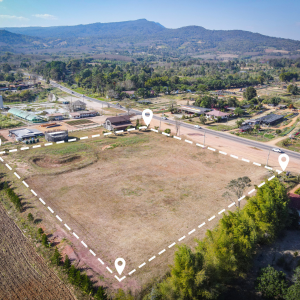
Understanding the Process of Selling Part of Your Land
You could sell some of your land. If you want to make more money, spend less time on repairs, or adjust to changes in your life, this guide will tell you why and how you might sell part of your home.
Why Sell Part of Your Property?

Several things could make you want to sell some of your property:
- Financial Gain: If you sell land, you can have more cash in the bank. You could make a lot of money if the value of your land goes up.
- Enhanced Property Value: Selling your home can make the one you still own more appealing or easier to take care of, which can raise its value.
- Market Conditions: There may be a lot of people who want to buy in your area right now if that’s the case.
Can I Sell Part of My Land?
Make sure you can sell before you do it. If you are eligible, it will depend on a number of laws in your area that have to do with zoning and subdivision. Remember this:
Determining Property Parcels
Split up your land into pieces if you want to sell some of it. These are the steps you need to take:
- Survey the Land: Get a professional to measure your land so you know how much you have and where the lines are.
- Legal Description: In the law, the parcel should have a clear description so that there are no problems in the future.
Subdivision Regulations and Planning Permission
People in the city or town may need to give you permission to sell some of your land. Check out these:
- Zoning Laws: Check to see if your land follows the land use laws for subdivisions in your area.
- Government Approval: Talk to the people in charge of land use in your area to get any permissions you need from the government.
Selling Mortgaged Land
Before you can sell any of your land that you still owe money on, you need to do these extra things:

- Lender Approval: Before you sell, ask your lender if it’s okay.
- Refinance Options: If you need to, you may need to change the terms of your mortgage after the sale.
- Interest and Payoff: Find out what will happen to your loan balance and interest rates when you sell your home.
Selling to a Neighbor
Since you live close and may like the same things, it might be easier to sell to a neighbor. Do not forget these:
- Boundary Agreements: Make sure the property lines are clear to avoid arguments.
- Negotiations: You should be honest with your neighbor so that you can make a deal that works for everyone.
If you want to sell land, it’s important to plan carefully and be aware of the costs and laws. Whether your goal is to make a profit, simplify your life, or for another reason, you can secure a good deal. Just ensure you fully understand the regulations.
Preparing Your Land for Sale
Determining Fair Market Value
Find out how much your land is worth on the open market before you sell it. This means you need to find out a lot of things, like how much your home is worth and how much land is worth now, and get an appraisal. A comparable sales analysis can help you figure out what’s going on in the market. After that, you’ll have a good idea of how much people are likely to pay.
Establishing Property Lines

It will take a lot of work and boundary markers to figure out where the lines of your property are. Hire a professional surveyor if you want to get a good idea of where your lines are. That way, there won’t be any arguments, and the property lines will be clear before the sale.
Necessary Documentation
For the deal to go smoothly, it’s important to have all the paperwork you need. In this, you’ll find titles, deeds, and surveys from the past. Having the right papers shows that you own something and makes sure you follow the law. If good records are kept, both the buyer and the seller can feel safe during the sale.
Addressing Utilities and Services
Before you sell your land, make sure that any utilities and services that are already there are taken care of. This could mean cutting ties, moving data, or setting up new connections. Taking care of these things the right way with the help of service providers makes sure that the land’s infrastructure is ready for the next owner. Getting your home ready can make it more appealing by showing that it is ready and reliable.
Finding and Engaging Buyers
Marketing Strategies
Use good marketing strategies to get people to buy your house. To get a lot of potential buyers interested in your home, start by listing it online. Anyone can look at your house through these listings from anywhere. You could also use local advertising to get people in your neighborhood or a nearby community to buy your home. If you network with a real estate professional, they can help you find serious buyers. By using these strategies, you can make your property more visible and get qualified leads.
Choosing a Sales Approach

Think about different ways to sell your home when you’re deciding how to do it. For Sale By Owner (FSBO) gives you more control but more work if you want to handle the process yourself. There is a commission fee when you hire a real estate expert or brokerage, but they can help you with less work. As a homeowner, you should think about these choices and pick the one that fits your needs the best. You could also ask someone for help deciding if a private sale is a good choice for you.
Negotiating Offers
In order to get a good deal, you should negotiate once you get an offer. Focus on getting the contract ready and getting a full legal review done right now to protect your interests. Know what the agreement says and be ready to talk about possible problems with the buyer. You can get help from a real estate lawyer with the legal stuff. Get ready to talk about terms that satisfy everyone without giving up on your goals.
Due Diligence for Buyers
It’s important to do your research before finalizing a sale. This includes following the rules for disclosure and making sure the property is inspected thoroughly. Buyers will probably need a survey and need to make sure that the land can be used for what they want to do. A search of the title shows that there are no claims that are still open. An appraisal will show how much the property is worth, which will help buyers make their choice. Taking care of these issues shows that you are honest and helps the transaction go smoothly.
Legal and Financial Aspects of the Sale
Legal Agreements
It is important to understand how the laws work when you sell a house. It’s important to get the deed ready, take care of the purchase agreement, and do a full title search. To make sure that everything is correct, a lawyer can help with the agreement process. Things stay on track, and the deal goes through without a hitch when you have good legal help.
Tax Implications

You need to know about the tax effects when you sell your home. You might have to pay capital gains tax if your home’s value has gone up. Talking to a financial advisor about the property tax duties that come with the sale is a good idea. You can pay your taxes on time, get the most out of your tax returns, and handle your money well if you plan ahead.
Mortgage Implications
You should know what will happen with your mortgage when you sell your house. You will have to pay off any mortgages that are already there. You may need to refinance or talk to your lender about this. If you need to, talk to your mortgage lender about how you can refinance. Please check the loan terms and rates to make sure they are good. Taking care of these things quickly can help you avoid stress over money and make sure you pay off your loans the right way.
Closing Process
The last thing that needs to be done to sell your home is the closing process. It includes taking care of escrow accounts, transferring the title, and going over all the paperwork that needs to be done. Everything will be legal if you hire a good lawyer. There is peace of mind for everyone because the closing is safe and goes well.
Post-Sale Considerations
Record Keeping
People who own property should keep records. If you keep accurate legal records, you can find out everything you need to know about a property. This means you should keep copies of important papers like mortgages, deeds, title insurance policies, and more. Good records can help you in court and make your home worth more over time.
Addressing Potential Disputes
There can be fights over the border, easements, or local zoning laws. Get these kinds of things taken care of right away to avoid problems down the road. Here are some ideas:
- Write down the edges of your property that you know about.
- Get to know any land rights that you can use.
- Know the zoning rules in your area to stay on the right side of the law.
Talking to lawyers can help people work out their differences without getting violent.
Future Planning

To make your investment worth more, you should think about how to manage the land and how it could be built. Check out these:
- Look for chances to make plans for changes that will raise the value of your home over time.
- Care about what the people in your area want, and look for projects that can help everyone reach their goals.
- Your ownership strategy should be reviewed and changed often so that you can take advantage of long-term investment and growth opportunities.
This helps people who own land make choices that are good for them and the neighborhood.
Additional Resources
Getting help from lawyers and accountants is a must if you want to manage your property well. These sources are good for getting information and help. To find the right consultants, click on the links below:
- Get real estate lawyers that you can trust and who know the law.
- Talk to money pros to make smart choices about what to invest in and how to spend your money.
- Use the tools you have access to to stay up to date on law changes and market trends.
Because you have these tools, you can make smart decisions that protect your property rights.
FAQs:
What are the steps to sell a portion of my land?
To sell part of your land, start with a thorough title search and check zoning rules. Consult a real estate attorney to ensure legal compliance. Have the property surveyed to define the boundaries of the parcel you want to sell. If needed, subdivide the land according to local laws and handle the paperwork. Finally, list the parcel with a real estate agent and negotiate pricing with buyers.
How do I calculate the value of my land before selling it?
Research recent sales of similar properties in your area to determine land value. Consider factors like location, size, and access to amenities. Consulting a real estate agent or appraiser can provide an accurate valuation. Remember to account for features like lakefront views or utilities that may increase value.
Can I sell land quickly without using a real estate agent?
Yes, you can sell land quickly without an agent through FSBO (For Sale By Owner). Set a competitive price based on a professional valuation, gather all necessary documents, and market the property using online platforms and social media. Be ready to handle negotiations and legal paperwork yourself, or hire a real estate attorney for help.
What are the tax implications when selling land?
When selling land, be aware of capital gains tax, which applies to profits from the sale. The amount depends on how long you owned the land and your overall income. Consult a tax professional to understand your obligations and prepare for any property taxes during the sale process. This ensures you manage all financial aspects correctly.
Is subdividing my land a good investment strategy?
Subdividing can be a smart investment as it lets you sell smaller parcels, often increasing total sales value. Before proceeding, consider costs like surveying and legal fees, and make sure local rules allow subdivision. Expert advice from a real estate consultant can help evaluate potential returns and risks.
What should I consider before leasing my land instead of selling?
If leasing, evaluate the long-term financial benefits compared to selling. Consider the type of lease (e.g., agricultural, hunting), maintenance responsibilities, and any impact on land value. Make sure you have a clear, legally binding lease agreement to protect both parties’ interests. This approach can generate ongoing income without losing ownership.
How does one secure financing for land purchase?
Financing land usually involves a land loan instead of a traditional mortgage. Approach lenders who specialize in these loans, as they understand land purchases better. You may need a larger down payment and pay higher interest rates. Ensure your credit is strong and be ready to provide a clear plan for the land’s use.
What should I include in a property listing to attract buyers?
A compelling property listing should have high-quality images, detailed descriptions of the land’s features, and information about zoning and utilities. Highlight unique attributes like proximity to schools, community areas, or scenic views. Include key data such as lot size, potential uses, and contact details. A well-crafted listing captures buyer interest and encourages inquiries.
Key Insights
- Sell Land Quickly: Learn how to sell land fast by using market insights, good marketing, and knowing your property’s value.
- Dividing and Selling Land: Understand how to sell land in parts, including strategies for subdividing and meeting legal requirements.
- Maximize Land Investment: Explore options in land investment to boost your financial portfolio and manage ownership well.
- Property Selling Tips: Get valuable tips on selling property, especially if you’re planning to sell part of your property.
- Property Management Basics: Learn essential land management skills, from taking care of shrubs to handling property taxes correctly.
- Exploring Land Types: Know the importance of understanding your land type, whether it’s acres in New Hampshire or scenic lakefront properties.
- Renewable Energy Considerations: Adding battery storage or using renewable energy can make your property more valuable.
- Rental and Leasing Options: Look into the benefits of renting or leasing, like townhomes and orchards.
- Pricing and Valuation: Set the right price and understand the value ratio to sell land without missing out on potential profits.
- Legal and Financial Aspects: Ensure you comply with laws and consider things like planning permission, insurance, and property tax.
- Strategic Marketing Approaches: Use different platforms and methods, like social media and RSS feeds, to reach potential buyers.
- FAQ Resources: Answer common questions about selling the entire property or specific land parcels with a detailed FAQ section.
- Preparing for Sale: Make sure you have proper documentation, maintenance, and expert advice before starting a sale.
- Location Impact: Learn how areas like Pennsylvania, Texas, and Washington can affect property value and buyer interest.
- Internal and External Factors: Stay aware of changes such as utility access, community development, and local rules.
This information applies to land sales in the United States, including states like Texas, Florida, California, and North Carolina. For additional support, contact us at (843) 606-1001 or visit our website at Fast Land Offers for more details.
Helpful Blog Articles
- How to Market Land for Sale: Effective Strategies to Attract Buyers
- Selling Land on Facebook Marketplace: A Step-by-Step Guide
- How to Sell a Part of Your Land
- A Guide to Selling Land Without an Attorney
- Effective Strategies To Avoid Capital Gains Tax When Selling Land
- Effective Strategies For Selling Land To Out-of-state Buyers In The Real Estate Market
- Do Sellers Need Title Insurance When Selling Land In Real Estate Transactions
- Understanding Real Estate Land Sales Realtor Commission
- Essential Guide To Understanding Closing Costs For Land Purchases In Real Estate
- Essential Guide To Crafting A Vacant Land Purchase Agreement In Real Estate
- Everything You Need to Know to Sell Land on Zillow
- The Ultimate Guide to Selling and Marketing Land


